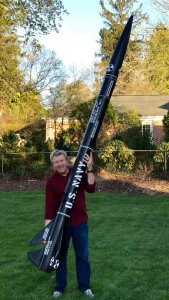Presented By: Aerospace Engineering
AE 585 Seminar Series - Relevance of Aircraft and Ship Wakes to Modern Problems of Ocean Remote Sensing and Climate Change
Eric Paterson, Professor and Head of Aerospace and Ocean Engineering Department, Virginia Tech

The subject of wake dynamics has been studied for well over 100 years. Control-volume analysis and boundary-layer theory have led to methods for computing drag and estimating basic properties of wakes, such as decay and spreading rates, whereas empirical flight testing expanded knowledge important for safe separation of aircraft during landing and takeoff. In general, it is well known that wakes from practical configurations are comprised of momentum sources and sinks, vortical structures, turbulence, and gravity waves. Furthermore, spatiotemporal description of wake evolution is a function of vehicle configuration, operational details (such as speed, heading, and altitude/depth), and the structure and properties of the environment.
Today, wake physics is important for a number of modern problems, including ocean remote sensing, aviation-induced cloudiness, and even the use of bubbly ship wakes for geoengineering Earth's future climate. The hallmark of these problems is their multi-physics and multi-scale nature which presents significant challenges to computational modeling and design of useful experiments. In this talk, these problems will be introduced and discussed, including relevance, formulation, status, and prognosis.
About the speaker...
Eric Paterson is the Rolls-Royce Commonwealth Professor and Head of the Kevin T. Crofton Department of Aerospace and Ocean Engineering at Virginia Tech. His research is in the general area of computational mechanics, and over the past 30 years he has worked on numerous diverse applications, including; naval hydrodynamics, remote and in-situ sensing, wind turbines, ocean renewable energy, deployable space structures, implantable cardiovascular devices, and biomimetic trace detectors.
In the spirit of Virginia Tech's motto Ut Prosim ("That I May Serve"), Dr. Paterson as Editor in Chief of SNAME's Journal of Ship Research, Chair of Education for AIAA, member of the Board of Trustees for the AIAA Foundation, Vice-Chair of the Aerospace Department Chairs Association, and as a member of several university and industry advisory boards and conference organizing committees.
Today, wake physics is important for a number of modern problems, including ocean remote sensing, aviation-induced cloudiness, and even the use of bubbly ship wakes for geoengineering Earth's future climate. The hallmark of these problems is their multi-physics and multi-scale nature which presents significant challenges to computational modeling and design of useful experiments. In this talk, these problems will be introduced and discussed, including relevance, formulation, status, and prognosis.
About the speaker...
Eric Paterson is the Rolls-Royce Commonwealth Professor and Head of the Kevin T. Crofton Department of Aerospace and Ocean Engineering at Virginia Tech. His research is in the general area of computational mechanics, and over the past 30 years he has worked on numerous diverse applications, including; naval hydrodynamics, remote and in-situ sensing, wind turbines, ocean renewable energy, deployable space structures, implantable cardiovascular devices, and biomimetic trace detectors.
In the spirit of Virginia Tech's motto Ut Prosim ("That I May Serve"), Dr. Paterson as Editor in Chief of SNAME's Journal of Ship Research, Chair of Education for AIAA, member of the Board of Trustees for the AIAA Foundation, Vice-Chair of the Aerospace Department Chairs Association, and as a member of several university and industry advisory boards and conference organizing committees.
Explore Similar Events
-
Loading Similar Events...
